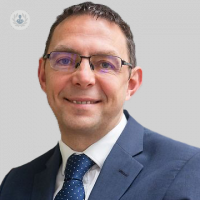How soon can I do exercise following heart surgery?
Written in association with:If you have been advised you need heart surgery, you may want to get back to your feet as soon as possible. Increasing your exercise levels in the days and weeks following surgery improves the rate of recovery. With the help of leading consultant cardiothoracic surgeon, Mr Neil Roberts, we take a look at how soon you can return to normal activity such as work, driving, exercise, and even general walking up and down stairs following surgery.

How long does it take to recover from heart surgery?
Heart surgery performed through a sternotomy takes a total of 2-3 months to recover. The more exercise a patient safely does, the better it is for recovery, with exercise helping to improve the rate of recovery, and avoid problems related to being bed-bound for too long.
- After the first 5-7 days patients should be able to walk up and down stairs, and will be able to walk around for short distances, such as going to the toilet unaided.
- After around 2-3 weeks patients will hopefully be able to walk a distance of around one mile. They will be advised to gradually increase the amount of exercise they do, and the distance that they walk.
- After around 4-6 weeks patients are advised to increase the amount of exercise they do, which can cause an uncomfortable feeling around the chest. Patients are advised not to do any heavy lifting to protect the sternum.
- Until after around 2 months patients are advised not to drive.
How soon after heart surgery can you start to do exercise?
Some exercise, such as walking, is permitted, and even encouraged straight after discharge from hospital. Increasing your walking activity is the first step to increasing exercise, and increased exercise leads to improved recovery rate.
The level of exercise that you do after surgery depends on your fitness level before surgery. If you were relatively fit and active before surgery, it will be easier for you to build back up to these levels.
Cycling on an indoor bike is possible within a few weeks of surgery, and running is possible within two months.
How soon can you go back to work following heart surgery?
How soon you can return to work depends on the type of surgery you have and the type of job you do. Heavy lifting and driving jobs should be avoided for 2 months, but patients with office jobs may want to go back after around 6 weeks or begin working from home.
What does rehab following heart surgery involve?
Following heart surgery, a rehabilitation programme run by physiotherapists is advised, as a way of getting the best from your recovery. Patients suffering with cardiovascular disease are often prone to other problems, such as back pain, arthritis, diabetes, and respiratory diseases such as asthma.
Following surgery, rehab can help you to recover from the surgery, and to make lifestyle changes to avoid the further onset of cardiovascular disease and its associated problems. There are a number of private, bespoke rehabilitation programmes available that will help optimise your recovery, and get you back to full health as soon as possible. Your doctor will advise you about available programmes.


